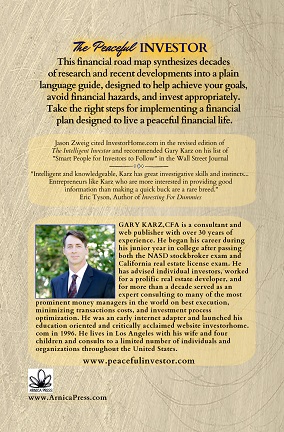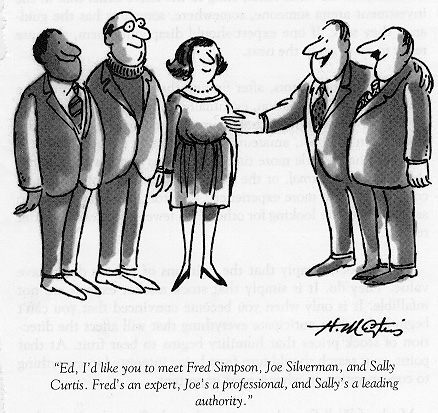

Buy The Peaceful Investor at Amazon
Table of Contents and Launch Site


I am offering the online chapters of the book using "The Honor System." Tip options at the bottom of the page.
Every year countless investors get scammed, swindled, and defrauded out of enormous amounts of money.1 In 2018, people in the U.S. reported losing $1.4 billion to fraud, an increase of $400 million over what consumers reported losing in 2017. There have been about 3 million claims of fraud, identity theft, and other reports per year in the U.S. annually from 2015 to 2018 according to the Federal Trade Commission's 2018 Consumer Sentinel Network Data Book.2 But over the years many individuals (including some prominent financial commentators) have made statements that the investment business itself is a scam. A related factor is the reality that many people don't trust financial organizations and so-called financial professionals. I would argue that some of that distrust (or at least skepticism) is warranted. Many in the investment business should be viewed with some suspicion. In fact Edelman.com surveys about trust annually and has often found that the financial services industry is the least trusted to do the right thing.3 But it’s important to clarify what investment activities and practices add value, and which are of questionable value or involve activities that can be associated with scams.
In 2014 Scott Adams (the creator of the popular Dilbert comic strip) wrote the following in his blog titled “How to Make More Money in Stocks.”4
"An investment advisor needs to justify his pay, and that means pretending to have stock-picking magical powers that science has never discovered. Every study on the topic shows that the professionals generally don’t beat the market average over time. But they do cause a lot of churn that causes a lot of unnecessary taxpaying on gains ... the financial industry as it stands now is the world’s biggest scam ... "
Source: Scott Adams - Dilbert
Some might be tempted to dismiss a statement of that sort, given it came from someone that makes a living with satire and making people laugh. The problem with that perspective is that similar accusations against the investment industry have come from individuals that work in the industry. Specifically, in an interview in 2004 with Businessweek, former Harvard Management CEO Jack Meyer stated “The investment business is a giant scam. It deletes billions of dollars every year in transaction costs and fees.”

In 2010 John Stossel did a show on Fox Business Network titled “The Investment Guidance Scam” that included an interview of Burton Malkiel, the author of A Random Walk down Wall Street.
In 2011 Andrew Haigney wrote in a BusinessInsider article "The bottom line is that the investment advice business is perhaps one of the greatest consumer scams of our time."5 Haigney was commenting on a NYTimes editorial by David Swenson titled “The Mutual Fund Merry-Go-Round.”6 Swensen summarized that "the industry has a history of delivering inferior results to investors, and its regulators do not provide effective oversight ... The companies that manage for-profit mutual funds face a fundamental conflict between producing profits for their owners and generating superior returns for their investors. Investors naïvely trust their brokers and advisers ... individual investors should take control of their financial destinies, educate themselves, avoid sales pitches and invest in a well-diversified portfolio ... The financial security of millions of Americans hangs in the balance."
In 2013 Robert Shiller stated in the NYTimes "Money management has been a profession involving a lot of fakery — people saying they can beat the market and they really can’t."7
I decided to create a presentation on this topic for the Los Angeles chapter of the American Association of Individual Investors. In February of 2018 I started by asking the over 100 attendees how many believed the investment business was a scam and I was somewhat surprised that about 20 people immediately raised their hands. That was before I had shown the preceding quotes or mentioned any of the following information.
Clearly, there is a serious issue with the perception of investment services that needs to be clarified and discussed further. The scam claims usually refer to a specific aspect of the investment business, which requires some explanation. But first, we need to define the term "scam." I've listed many definitions of "scam" and their sources below. Many define scam with some qualification that the activity involves "illegal" or "fraudulent" activity. But others use lesser standards and language like "deception" or "dishonesty," while some have even less stringent definitions that include any strategy used to achieve a gain, or quick profit.
Scam definitions vary and include the following.
- a fraudulent or deceptive act or operation (Merriam-Webster)8
- a fraudulent business scheme; a swindle (FreeDictionary)9
- an illegal plan for making money (Cambridge)10
- the act of swindling by some fraudulent scheme (Vocabulary.com)11
- a dishonest plan, especially for getting money (Macmillan)12
- a stratagem for gain; a swindle (Collins)13
- a confidence game or other fraudulent scheme, especially for making a quick profit; swindle. (Reference.com)14
If you apply a standard in defining "scam" to include fraud or illegal activity, calling the broad investment business a scam is a stretch. But by using standards that only require deception, or dishonesty, a much stronger case can be made for labelling some of the investment and financial industries as having some aspects of a scam. Further, if you define a scam to include any scheme, strategy, stratagem, or confidence game for the purpose of profiting or making money, the scam label is even easier to justify.
Frank Abagnale was the inspiration for the 2002 movie “Catch Me If You Can” starring Leonardo DiCaprio and he suggests in December 5, 2019 video on CNBC that every con involves an urgent, immediate need for money (and a request for personal information).15 The investment business tends to involve a longer cycle over time, but he also notes that "con" man stands for confidence man and we know overconfidence is a major factor for investors and investment professionals. So, in addition to evaluating whether specific investment products or services can be interpreted as a scam, it’s also appropriate to identify those that are inferior, or potentially obsolete relative to alternative investment options.
This brings us to the critical question of what specific functions and processes investment "professionals" provide and whether those services add value. Services that have positive expected contributions are appropriate to be labelled as investment services. The follow-up question then becomes what is the value of those services and how much is reasonable to pay for them. Helping investors identify and determine their financial status, save, and plan future expenditures are roles that are not generally in question for this topic.
Many of the comments that associate the investment business with scams are directed at the so-called "active management" industry. One of the major benefits of the evolution of the investment industry and modern investment vehicles is that it allows investors to focus their investments and disentangle various financial activities. Before the creation of mutual funds, investors bought individual securities. The creation of mutual funds allowed investors to diversify and reduce single stock (or sector) risks. The introduction of index funds further allowed investors to diversify completely by asset class without betting on a specific manager or style. Plus index funds tend to have lower costs and lower turnover, which offer additional advantages.
The complexity of many investments products, as well as the complications and unique circumstances that many individuals face, creates a potentially overwhelming scenario for many investors. The more recent evolution of target date funds and Robo-Advisors allows investors to simplify the start-up process, and invest cheaply with a modest amount of time needed. The newer products determine a reasonable asset allocation and automatically rebalance over time. In other words, some investors can bypass many of the potentially confusing issues by using these newer options that are designed to streamline identifying the main factors and invest in a low-cost appropriate portfolio that will automatically adjust over time.
The newer target date and automated options will likely continue to increase market share, but many investors will likely continue to invest directly in securities and through various types of funds. The next chapter focuses on defining investment and speculation, focusing on the role of active management and the role of index funds, which will help answer the question of what categories of financial services might be considered in the scam category.
Investors should keep in mind that there are two participants in a scam. Every scam has a scammer, and the person or people that get scammed. One of the reasons that scams exist is because they often prey on investors’ greed and naiveté. Most have heard the warning that "If it sounds too good to be true, it probably is," but not every scammed investor has dreams of making millions and living the life of a celebrity. Many are just looking for a decent return on their investments, and for those it’s important to get educated about activities that add value, so they can avoid inefficient activities, as well as costs that sap returns, or eat into principal.

Notes - The Footnotes in the Book are sequential and for this chapter start at #72 and end at #86.
1. See for a recent example https://www.nytimes.com/2019/03/01/your-money/money-answers-man-jordan-goodman.html Investors are estimated to lose $ billions annually (see https://thecollegeinvestor.com/1944/top-investment-scams/) and phishing scams are estimated to cost tens of thousands of people $ millions annually (see https://www.cnn.com/2019/10/27/business/phishing-bank-scam-trnd/index.html)
2. https://www.ftc.gov/system/files/documents/reports/consumer-sentinel-network-data-book-2018/consumer_sentinel_network_data_book_2018_0.pdf
3. https://www.edelman.com/ see also https://www.cnbc.com/2018/01/12/financial-services-industry-needs-to-regain-consumer-trust.html https://www.slideshare.net/EdelmanInsights/2017-edelman-trust-barometer-financial-services-results https://blogs.cfainstitute.org/marketintegrity/2017/02/28/2017-edelman-trust-barometer-shows-overall-decline-but-financial-services-improves/ https://blogs.cfainstitute.org/marketintegrity/2013/02/13/and-the-survey-says-trust-in-financial-services-still-ranks-low/ Other related data can be found at http://www.financialtrustindex.org/
4. http://www.dilbert.com/blog/entry/how_to_make_more_money_in_stocks/ (8/4/2014)
5. http://www.businessinsider.com/investment-advice-is-one-of-the-greatest-scams-of-our-time-2011-9 (9/1/2011)
6. http://www.nytimes.com/2011/08/14/opinion/sunday/the-mutual-fund-merry-go-round.html?pagewanted=all&_r=0 (8/13/2011)
7. http://www.nytimes.com/2013/10/20/business/robert-shiller-a-skeptic-and-a-nobel-winner.html
8. http://www.merriam-webster.com/dictionary/scam?show=0&t=1360117225
9. http://www.thefreedictionary.com/scam
10. http://dictionary.cambridge.org/dictionary/british/scam
11. http://www.vocabulary.com/dictionary/scam
12. http://www.macmillandictionary.com/dictionary/american/scam
13. http://www.collinsdictionary.com/dictionary/english/scam
14. http://dictionary.reference.com/browse/scam?r=66
15. https://www.cnbc.com/2019/12/05/catch-me-if-you-cans-frank-abagnale-says-every-scam-has-2-red-flags.html
I am offering the online chapters of The Peaceful Investor using "The Honor System." If you don't plan to purchase a version of the book, yet you think it was worth your time and you learned a significant amount, you can tip or compensate me in a number of ways. This will probably not be tax deductible for you, but I will report and pay taxes on any payments.
If you don't think the material was worthwhile, I would appreciate emails letting me know what you read and whether you disagree with anything in particular. I would also appreciate anyone letting me know if they find any typos, mistakes, or suggestions how to improve the material.
- Paypal me at gkarz@aol.com
- Pay me by credit card. Email me (proficient at aol.com) with an amount you'd like to donate and I will email you an invoice via Square.com. I will not have access to your information - you would enter it on the secure square website.
- Before you make purchases at Amazon, link through one of my links. As an Amazon Associate I earn from qualifying purchases.
- Contact me to inquire about a review or second opinion of your finances.